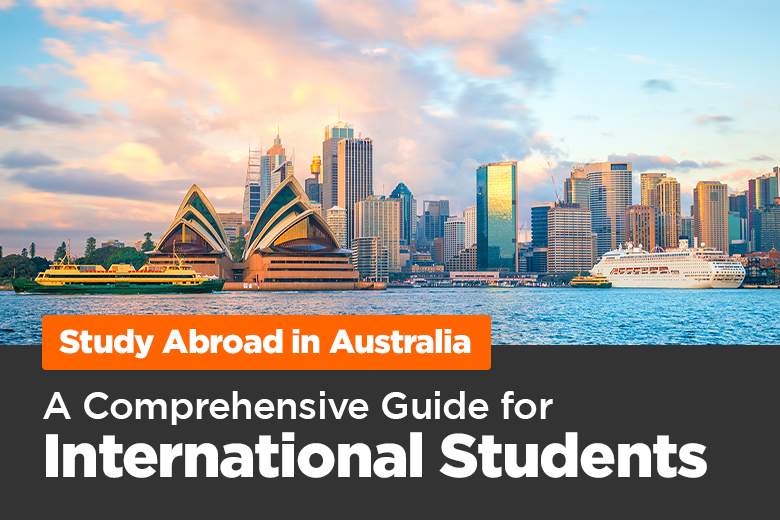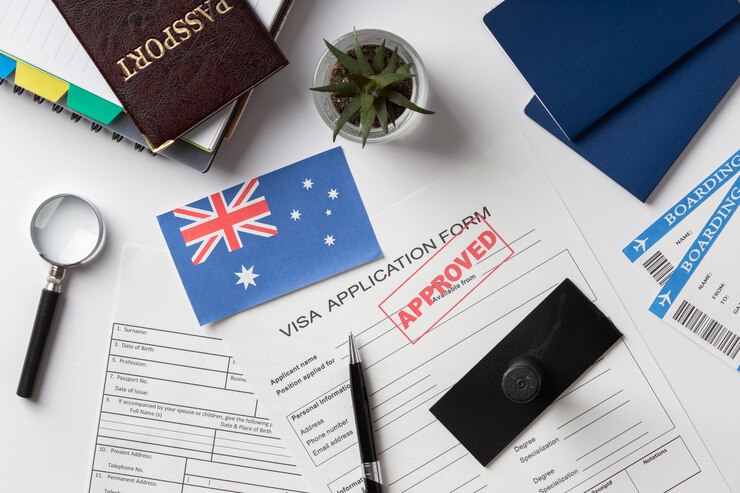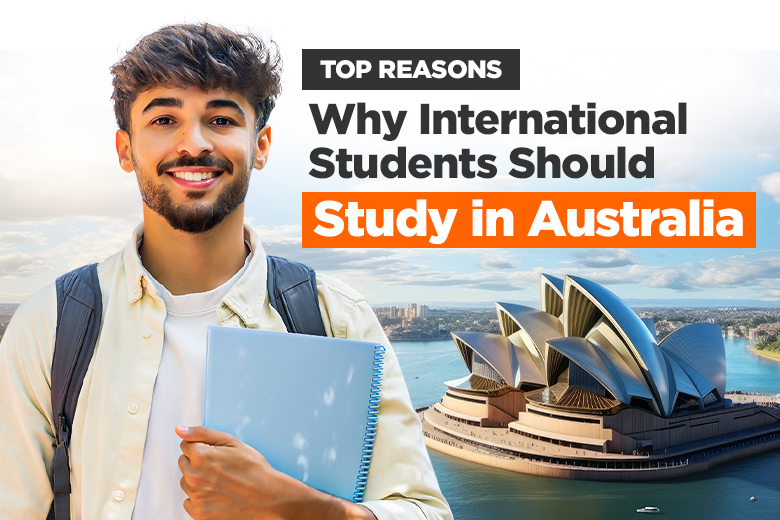Study Abroad in Australia: A Comprehensive Guide for International Students

If you are reading this, chances are that the idea of pursuing your education abroad has crossed your mind. For students venturing from foreign shores, the desire for a study environment that resonates with the comfort of home and aligns with their educational objectives is only natural. Australia not only fulfills these expectations but goes above and beyond.
Australia is not only home to the world’s friendliest people and the quirkiest wildlife, but it also has one of the best educational systems in the world. Every student can find the ideal fit at one of the renowned universities. Well, get ready as StudyCo Education Consultants guide you through an Australian experience that extends far beyond kangaroos and vegemite. Here’s a comprehensive guide for international students aspiring to pursue their education in the vibrant and welcoming academic landscape of Australia. Step into the amazing world of Australia where top-tier education, a lively culture and a conducive atmosphere wait for international students.
Know the education system
Any overseas student starting their academic adventure in Australia must first know the Australian educational system. The education system consists of primary and secondary education, followed by tertiary education. Australia has a total of 43 universities, comprising 40 government-funded, two international, and one privately specialized university. Students have the option to pursue on-campus undergraduate degrees or advanced studies through postgraduate programs, which include certificates, postgraduate diplomas, master’s, and doctoral programs. Additionally, vocational courses emphasize hands-on skills and industry training.
At the core of this system lies the Australian Qualifications Framework (AQF), offering a unique blend of adaptability, choices, and thoughtful career planning. Not only does it delineate the criteria for postsecondary education and vocational training, but it also provides a distinctive approach to navigating these pathways.
Renowned for their research capabilities and efficient teaching methods, Australian universities draw students from all over the world. The unique feature of this system is that degrees granted under the AQF are recognized throughout the world, making graduates highly employable not just in Australia but also in other countries such as New Zealand, Canada and the US.
Select the right course
Selecting the right course is a pivotal decision on your study abroad journey. Dive into thorough research on universities and colleges that offer your desired program, taking into account crucial factors like course content, faculty expertise, and location. Beyond the academic prospect, consider the long-term impact on your career, focusing on qualifications that are currently in demand to enhance your post-study employment prospects.
Australia provided a plethora of courses and degrees, each designed to impart practical skills for a competitive edge in the job market. From the analytical world of Accountancy to the hands-on field of Agricultural Science, and the compassionate realm of Nursing to the dynamic landscape of IT, Australia offers a large number of educational opportunities. These high-on-demand courses extend to fields like Education, Project Management, Law, and Social Work, providing a diverse array of choices.
Opting for these popular courses not only enhances your chances of gaining employment but also opens doors to various opportunities. From improved visa options to scholarships and promising Permanent Residency (PR) prospects, the advantages are manifold. Many students also prefer Professional Year Programs (PYPs), who directly want to jump into a professional career.
Admission requirements
Admission prerequisites vary across institutions including but not limited to academic qualifications, English language proficiency, and sometimes interviews. It is crucial to meticulously review the specific requirements outlined by your chosen institution. Enrolling in Australia’s premier courses and universities may demand extra effort, yet the rewards in terms of experiences and opportunities are well worth it. As admission criteria are set individually by each university, it is advisable to visit their respective websites for detailed information tailored to your academic aspirations.
Requirement for an undergraduate degree in Australia:
- Successful completion of the Year 12 or equivalent board
- Language proficiency requirements: IELTS score of at least 6.0 in each module;
- TOEFL and PTE is also accepted as an alternative language proficiency test
Requirement for a postgraduate degree in Australia:
- Acceptance of a recognized Bachelor’s degree, including those with a duration of three years
- Language proficiency requirements: IELTS overall score of 6.5 with at least 6 in each band; alternatively, TOEFL score of 79 overall and PTE score of 58.
- Work experience may be necessary to fill any gaps in qualifications
- Submission of a Statement of Purpose (SOP)
Requirement for PhD program in Australia:
- Possession of an Honours degree or a Bachelor’s degree with Honours, spanning a minimum of 3-4 years in an appropriate discipline
- Alternatively, having a relevant Master’s degree or demonstrating to the Dean of Research that previous education, professional experience, and published research work are of sufficient quality and relevance to prepare for a research degree
- English Language proficiency requirements: IELTS – 6.5, TOEFL – 85, PTE – 61
- Submission of a research proposal (if you are putting forward your PhD topic)
- Requirement of a personal statement
- Academic and professional references
Note that additional requirements for any course/degree in Australia may vary depending on the specific university.
Obtaining a visa
For international students aiming to reside and study in Australia, obtaining the Australian student visa, specifically the Subclass 500 Student Visa, is mandatory. To satisfy the visa requirements set by the Australian Department of Home Affairs, certain documents are essential.
During the visa application process, be prepared to submit the following documents:
- Completed visa application
- University-issued application letter
- Statement of Purpose
- Marriage certificate (if applicable)
- Medical reports
- Valid passport
- Police clearance certificates
- Proof of financial means and related documents
- Processing fees for the visa application
Get an Australian Study Permit
Acquiring an Australian Study Permit is a crucial part of your journey to study in Australia. To obtain this permit, you’ll navigate through a series of steps designed to ensure a smooth and legitimate application process:
Select Your Course and Educational Institute: Begin by choosing a course and educational institution based on factors such as program duration, study costs, academic requirements, and the curriculum that aligns with your preferences. This information is typically available on the official website of the chosen institution, or you may seek assistance from StudyCo.
Receive Confirmation of Enrolment: Once you’ve decided on a course and institution, obtain the Confirmation of Enrolment (CoE) from the educational institute. This document is a vital prerequisite for your visa application.
Create an Account with Australian Immigration Authorities: Set up an account with the Australian immigration authorities, which will serve as the platform for your visa application process.
Complete Visa Application: Proceed to complete the visa application, providing accurate and comprehensive information. This step is critical to ensure the timely and successful processing of your study permit.
Payment of Visa Fee and TRN-Number: Pay the required visa fee and obtain a Transaction Reference Number (TRN), a unique identifier for your visa application.
Health Checkup and Interview: Undergo a health checkup and any necessary interviews as part of the visa application process. This step ensures that you meet the health and character requirements set by the Australian authorities.
Wait for Visa Decision: Patiently wait for the outcome of your visa application. Once a decision is made, carefully review and accept your visa, marking the final step in securing your Australian Study Permit.

Financial Planning
Studying in Australia might come with a hefty price tag, but fear not, for there are various avenues to explore in managing your finances. Tuition fees for degree programs can vary, prompting the need for a planned budget covering not just academic expenses but also living costs and unforeseen financial challenges. However, the good news is that Australia offers a multitude of options, including scholarships and part-time work opportunities, designed to lighten your financial burden.
Australia is rich with government and university-specific scholarships specifically designed for international students. Seize these opportunities, transforming your desire to study in Australia into an achievable goal, where financial considerations become a manageable aspect of your educational journey.
Accommodation and living expenses
In Australia, you have different accommodation choices, from on-campus living to shared apartments. Accommodation expenses vary due to factors such as the place of residence, the dimensions of the apartment (in case of renting), the location (urban areas typically incur higher costs), whether the living space is shared or not, and other relevant considerations. Therefore, it is preferable to initiate your search ahead of time to secure a housing arrangement that suits you best. As an international student, consider budgeting between 1,400 and 2,500 AUD per month to cover living expenses, encompassing accommodation and food. This financial planning ensures you have flexibility and peace of mind as you embark on your study abroad journey.
If you opt for homestays, anticipate an average monthly expenditure ranging from 450 AUD to 1200 AUD. Homestays generally offer a more economical alternative compared to apartments, where costs typically range from 750 to 1700 AUD. International students often find it practical to share apartments with friends, colleagues, or relatives, incurring expenses in the range of 650 to 950 AUD, driven by financial considerations and management. Additionally, the location of your university plays a crucial role in determining living costs; for instance, living expenses for international students are notably higher in Sydney, Melbourne, Brisbane, Adelaide, and Perth compared to cities like Gold Coast and Canberra.
Similarly, for food, cooking your own meals instead of dining at upscale restaurants can make food expenses more manageable. Regularly eating out can significantly raise costs. Optimal cost-saving involves finding local grocery stores in Australia that stock ingredients for your native dishes, facilitating ease for international students to prepare their own meals.
Health cover and insurance
As per the department of Home Affairs, maintaining Overseas Student Health Cover (OSHC) throughout your stay in Australia is important. OSHC is also a prerequisite for obtaining an Australian Student Visa. It is compulsory for international students to have health insurance. The cover is provided to the international students who don’t have an access to the Australian Public Health Care. OSHC aids international students in managing medical expenses during their study period in Australia, encompassing doctor visits, hospital stays, emergency ambulances, and prescription medications. Basic OSHC plans usually do not cover dental care, optical services, and physiotherapy as part of their standard offerings. For that, extra OSHC cover is required. International students, already grappling with tuition and living costs, may face additional financial strain from hospital and medical expenses in the absence of insurance.
The OSHC cost is determined by factors such as your study duration, visa type, and the number of individuals covered by your policy. Approved health funds for OSHC by the Department of Health in Australia include: BUPA Australia, CBHS International Health, Medibank Private, ahm OSHC, Allianz Care Australia (Peoplecare) and NIB OSHC. Research on each service provider before buying any policy will always be beneficial for you to meet your specific needs.
Employment opportunities
Under the study visa, the Australian government permits international students to work for up to 48 hours fortnight during their academic terms and full time during their vacation. Opting for paid internships is an excellent avenue for those seeking practical exposure in their chosen field of study. During vacation periods, students have the chance to maximize their earnings, as there are no restrictions on working hours. Additionally, the Australian government extends post-study work visas, enabling graduates to work in the country for a designated period post-completion of their studies. Familiarize yourself with the regulations and seek part-time employment to supplement your expenses.
Transportation
Living costs for students in Australia involve transportation within cities. If your accommodation is far from the university, you may face significant travel expenses. To manage costs, take advantage of student discounts. Choosing public transportation like buses, trains, trams, ferries or bicycles is a budget-friendly and convenient substitute for taxis.
Every state and territory operates its own transport network authority, overseeing the management of public transportation within its borders. Some regions offer concessions on public transport for international students, while others do not provide such concessions (like Sydney). Various types of ticketing cards are used in the public transportation systems across Australia. The Myway card is used in the Australian Capital Territory (ACT), Opal card in New South Wales (NSW), Tap and Ride card in the Northern Territory (NT), Go card in Queensland (QLD), Metro card in South Australia (SA), Green card in Tasmania (TAS), Myki card in Victoria (VIC), and SmartRider card in Western Australia (WA).
Students mostly don’t prefer using taxis /cabs for regular transport as they are quite expensive. They prefer ride sharing apps like Uber, Ola, Didi to taxis as they are much cheaper options to travel.
Tax File Number (TFN)
A Tax File Number (TFN) is a unique identification number issued by the Australian Taxation Office (ATO) to individuals and organizations for tax and other financial purposes. It is used to track and manage tax-related activities, including income, employment, and government benefits in Australia. Having a TFN is essential for legal employment, lodging tax returns, and conducting various financial transactions in the country. Hence, one of the prior works to be done when you are in Australia is to get your TFN. It will help you, especially when you are seeking jobs in Australia.

Multicultural environment
Cultural diversity stands out as a defining feature of life in Australia. For international students, this rich culture ensures exposure to a vibrant and hospitable environment, encouraging them to step beyond their comfort zones and broaden their perspectives with fresh ideas and insights.
There you have it, future Aussie scholars! Australia isn’t just a destination; it’s an experience that will broaden your horizons, challenge your perspectives, and undoubtedly leave you with memories to last a lifetime. Beyond the textbooks and educational blocks, Australia invites you into a world of stunning landscapes, the genuine warmth of its people, and an education that knows no bounds.





